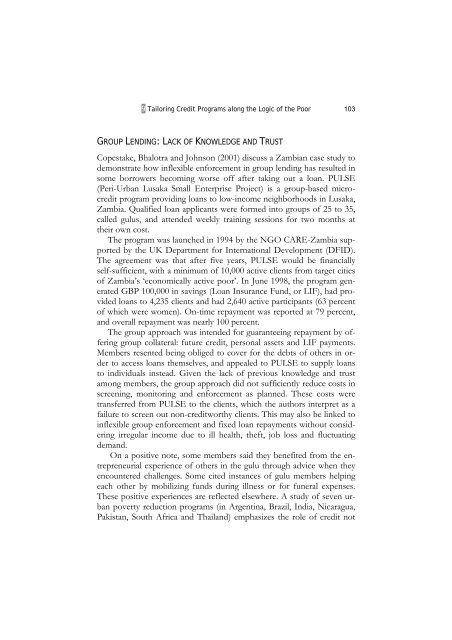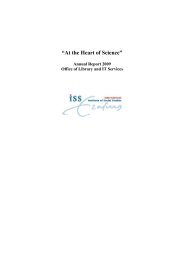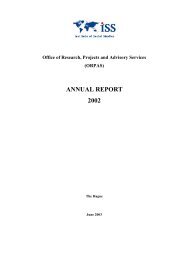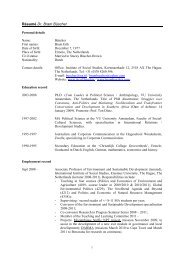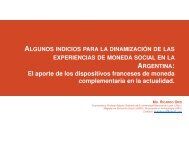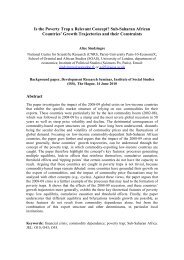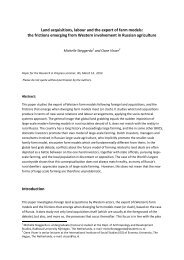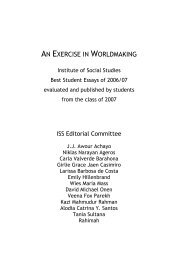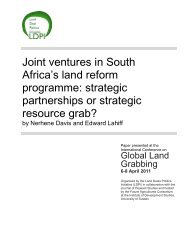AN EXERCISE IN WORLDMAKING 2009 - ISS
AN EXERCISE IN WORLDMAKING 2009 - ISS
AN EXERCISE IN WORLDMAKING 2009 - ISS
Create successful ePaper yourself
Turn your PDF publications into a flip-book with our unique Google optimized e-Paper software.
9 Tailoring Credit Programs along the Logic of the Poor 103<br />
GROUP LEND<strong>IN</strong>G: LACK OF KNOWLEDGE <strong>AN</strong>D TRUST<br />
Copestake, Bhalotra and Johnson (2001) discuss a Zambian case study to<br />
demonstrate how inflexible enforcement in group lending has resulted in<br />
some borrowers becoming worse off after taking out a loan. PULSE<br />
(Peri-Urban Lusaka Small Enterprise Project) is a group-based microcredit<br />
program providing loans to low-income neighborhoods in Lusaka,<br />
Zambia. Qualified loan applicants were formed into groups of 25 to 35,<br />
called gulus, and attended weekly training sessions for two months at<br />
their own cost.<br />
The program was launched in 1994 by the NGO CARE-Zambia supported<br />
by the UK Department for International Development (DFID).<br />
The agreement was that after five years, PULSE would be financially<br />
self-sufficient, with a minimum of 10,000 active clients from target cities<br />
of Zambia’s ‘economically active poor’. In June 1998, the program generated<br />
GBP 100,000 in savings (Loan Insurance Fund, or LIF), had provided<br />
loans to 4,235 clients and had 2,640 active participants (63 percent<br />
of which were women). On-time repayment was reported at 79 percent,<br />
and overall repayment was nearly 100 percent.<br />
The group approach was intended for guaranteeing repayment by offering<br />
group collateral: future credit, personal assets and LIF payments.<br />
Members resented being obliged to cover for the debts of others in order<br />
to access loans themselves, and appealed to PULSE to supply loans<br />
to individuals instead. Given the lack of previous knowledge and trust<br />
among members, the group approach did not sufficiently reduce costs in<br />
screening, monitoring and enforcement as planned. These costs were<br />
transferred from PULSE to the clients, which the authors interpret as a<br />
failure to screen out non-creditworthy clients. This may also be linked to<br />
inflexible group enforcement and fixed loan repayments without considering<br />
irregular income due to ill health, theft, job loss and fluctuating<br />
demand.<br />
On a positive note, some members said they benefited from the entrepreneurial<br />
experience of others in the gulu through advice when they<br />
encountered challenges. Some cited instances of gulu members helping<br />
each other by mobilizing funds during illness or for funeral expenses.<br />
These positive experiences are reflected elsewhere. A study of seven urban<br />
poverty reduction programs (in Argentina, Brazil, India, Nicaragua,<br />
Pakistan, South Africa and Thailand) emphasizes the role of credit not


